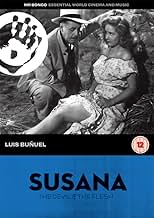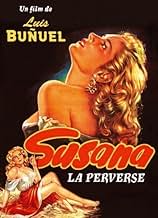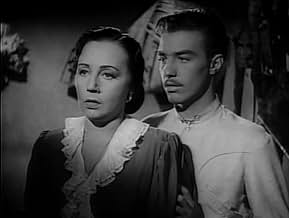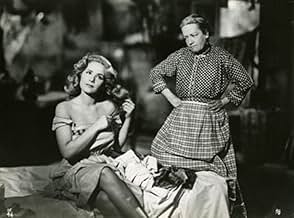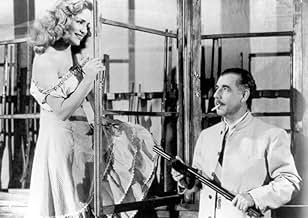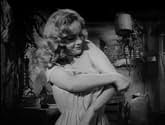An unstable young woman escapes from a reformatory for seriously wayward girls and deceptively finds shelter in the kind home of a frighteningly nice and decent family. Little by little, she... Read allAn unstable young woman escapes from a reformatory for seriously wayward girls and deceptively finds shelter in the kind home of a frighteningly nice and decent family. Little by little, she causes unrest and discord among the members of the household until they are all fighting ... Read allAn unstable young woman escapes from a reformatory for seriously wayward girls and deceptively finds shelter in the kind home of a frighteningly nice and decent family. Little by little, she causes unrest and discord among the members of the household until they are all fighting with one another.
- Awards
- 1 nomination total
- Empleado de Guadalupe
- (uncredited)
- Empleada de Guadalupe
- (uncredited)
Featured reviews
Good though not great Bunuel
A rare Bunuel film where the pious Christian prevails over others
The film is also a major departure for actor Fernando Soler playing the role of the rich landowner who gives a tepid performance compared to the one he gave in the other Bunuel film "The Great Madcap" (1949) made 2 years before this film.
Good film about an unstable young delinquent getting away from a reformatory and finds solace at a wealthy home , being well directed by the Spanish Luis Buñuel
The movie is well worthy thanks to razor-sharp performances as well as certain critical revealing the hypocrisies of modern society , in which a wayward girl uses the power of manipulation and eroticism to get her dark purports and eventually causing distresses until they are virtually struggling with each other . The picture features exceptional work by Rosita Quintana , she's magnificently charming as well as hateful playing the insidious Susana who attempts to dissect the harmonious family group . Her acting result to be a phenomenal precedent to the character who played Sue Lyon in ¨Lolita¨ or Carrol Baker in ¨Baby Doll¨ . The baddie female is really a selfish young , a manipulating babe who hates and seduces , as well as uses her feminine wiles to tempt all around . Furthermore, a beautifully cinematography in subdued black and white by José Ortiz Ramos , being shot , as usual , in Estudios Churubusco Azteca, Mexico City, Distrito Federal, Mexico. And atmospheric and appropriate musical score by Raúl Lavista.
The motion picture was competently directed by Luis Buñuel , belonging to his Mexican period and it won Ariel Awards, Mexico 1952 and Nominee Silver Ariel Best Young Actor Luis López Somoza . After shooting Spanish and French films as "Un Chien Andalou" (1929) , and ¨Age of Gold¨(1930) , ¨Hurdes tierra sin pan¨ (1936) , Buñuel went on his Mexican period in which he teamed up with producer Óscar Dancigers and after a couple of unmemorable efforts shot back to international attention with the lacerating study of Mexican street urchins in ¨Los Olvidados¨ (1950) , winning him the Best Director award at the Cannes Film Festival . But despite this new-found acclaim, Buñuel spent much of the next decade working on a variety of ultra-low-budget films, few of which made much impact outside Spanish-speaking countries , though many of them are well worth seeking out . As he went on filming "The Great Madcap" , ¨The brute¨, "Wuthering Heights", ¨El¨ , "The Criminal Life of Archibaldo De la Cruz" , ¨Robinson Crusoe¨ , ¨Death in the garden¨ and many others . And finally his second French-Spanish period , usually in collaboration with producer Serge Silberman and writer Jean-Claude Carrière with notorious as well as polemic films , such as : ¨Viridiana¨ , Tristana¨ , ¨The Discreet Charm of the Bourgeoisie" and his last picture , "That Obscure Object of Desire" . Susana rating : 7.5/10 . Essential and indispensable seeing for Luis Buñuel aficionados.
What happened to Susana?
Susana escapes from the reformatory in which she was locked. It's a dark and stormy night. Meanwhile in a ranch nearby the members of a peaceful family follow their occupations. An old servant maid is mumbling that in nights like this the devil walks around. Thunder and lightning. Susana's face appears in the window. She faints. She is brought inside the house. Susana is a young girl with a wayward sensuality (remember, we are in 1951). Her presence will bring discord and threaten the stability of the family.
Buñuel, even in his most surrealistic films, was always deeply anchored in the reality. That is why his films are so strong. His films have a taste of earth, humanity, sensuality. "Susana" is in fact a very sensual film. The camera subtly follows Susana, her chaotic sensuality, and the other characters' reactions to her. She's the main character but not much is told about her. She was locked in a reformatory. Why? We are not told. The world doesn't accept her and her ways. Does she know what she really wants? Unfortunately it was not possible for Buñuel to give us a deeper portrait of Susana. We see her mostly through the eyes of the outside world. Why is Susana like that? What happened to Susana?
"Susana" is an over-the-top melodrama - seemingly innocent, but in the "happy ending", that seems to come out of a fairy tale, some people may detect a hidden laughter. The film was a big success in Mexico and contributed to establish definitely Buñuel as a commercially viable director.
Rosita Quintana as Susana proves her wide acting range (a shy governess in "La Ausente" and a sensual temptress in "Susana"). She's beautiful and in "Susana", she's a real volcano. Fernando Soler also distinguishes himself as the pater familias (he was also the moralist judge in "Sensualidad" and the dissolute drinking father in "Oveja Negra").
Actors and scenery are harmoniously integrated in "Susana" and Buñuel is (as always) a master of images and very adept in creating mood. Highly recommended!
SUSANA is a fetching microcosm of Buñuel's views on human frailties, unambitious, simple but integral and surprisingly gratifying
In fact, the movie itself is grounded on a surreal precondition, in the opening scenes, Susana is locked up in a solitary cell, she entreats God in front of a cross materialised by the shadows of the metal bars, to give her a way out since she can not change her nature, which is made by God himself, so God grants her wish, as if he wants to cast a prank on us, releases the snake into the Garden of Eden. The script runs formulaic-ally where three different types of men all become the victims of Susana's seduction, Rosita Quintana successful captures her carnal allure with crude histrionics, for the spunky Jesús, she is the unattainable wench who promises him something sweet but refuses his pushing courtship; for the bookish Alberto, she is a proactive seductress from whom he is too green to resist, and for the patrician Guadalupe, she becomes a damsel in distress, who inadvertently rekindles his sexual urge which a married middle-age man can no longer obtain from his wife. While men are succumbing to their primitive lust, after seeing through her veiled pretence, Carmen and Felisa strike up, only that would be too late if Buñuel had opted for a more sinister finale.
The happy ending is a policy of appeasement, even the mare miraculously regains its vitality, but the re-gained conformity and harmony appear so ironic thanks to Buñuel's poker-faced mockery - how simple a weed in the field can bring about moral corruption to a conventional middle-class family. SUSANA is a fetching microcosm of Buñuel's views on human frailties, unambitious, simple but integral and surprisingly gratifying.
Did you know
- How long is Susana?Powered by Alexa
Details
- Release date
- Country of origin
- Official site
- Language
- Also known as
- Susanna - Tochter des Lasters
- Filming locations
- Production companies
- See more company credits at IMDbPro
- Runtime
- 1h 26m(86 min)
- Color
- Aspect ratio
- 1.37 : 1

